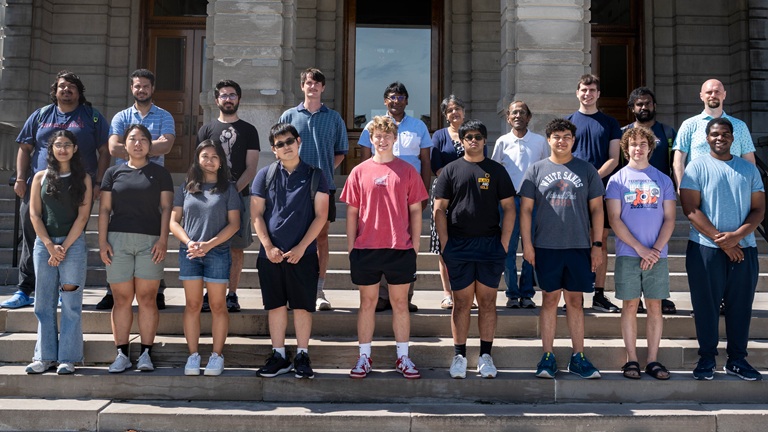August 06, 2025
Students from across the country investigated the possibilities of consumer networking technology and AI at Mizzou Engineering.

At Mizzou Engineering, we prioritize collaboration and provide students from all over with new, transformative perspectives on the world. One such hands-on learning opportunity was this summer’s Research Experience for Undergraduates (REU) in Consumer Networking Technologies. This year’s edition was the 18th of the program, one of the longest running REU sites in the nation.
“The goal is to help undergraduate students become problem-solvers and innovative thinkers to solve purposeful and compassionate research problems,” said Prasad Calyam, Curators’ Distinguished Professor in the Department of Electrical Engineering and Computer Science (EECS), who runs the REU.
This summer’s program selected 10 students from over 185 applicants nationwide. Their research tackled artificial intelligence (AI), mobile sensing, environment recognition, software-defined networking, virtual reality (VR) and other topics.
One unique aspect of Calyam’s REU is its emphasis on publication.
“Almost every project results in a peer-reviewed publication or presentation,” Calyam said. “Students leave with experience in science communication, including posters, workshops or conference papers, which helps kick-start their scholarly careers.”
Lehigh University computer science major Joelle Dizon used large language models to generate code for cybersecurity tools.
“What drew me to this program was the opportunity to investigate real technical challenges — cybersecurity, data, etc. — in a collaborative environment,” she said. “The emphasis on communication through weekly progress presentations and final reports will help me grow as a researcher and a communicator.”
Vincent Zheng, a computer science major from Stony Brook University, spent his summer working on a project to teach drones to analyze and understand what they see. He built AI models using Meta’s PyTorch machine learning library and ran drone simulations using the AERPAW wireless research platform.
“I chose this REU because it aligns with my interests in systems and AI, especially the opportunity to work on real-world challenges like UAV analytics and federated learning,” he said. “The program’s strong mentorship and potential for publishable research made it stand out.”
Other participants came from Colgate University, Columbia College, Florida Gulf Coast University, Iowa State University and the University of Maryland as well as Mizzou. Their projects involved wearable sensing technologies, secure AI systems for remote patient monitoring, and deep learning for computer vision and networking applications.
Guiding the students were faculty mentors Kannappan Palaniappan, Yi Shang, Ekincan Ufuktepe, Noah Glaser, Tanu Malik, Jianfeng Zhou and Tim Trull. Vani Seth, a graduate student in EECS, served as the student coordinator and helped with logistics and schedule management of the program.
Calyam said the program’s impact extends far beyond the summer.
“It’s not just about the tech,” he said. “It’s about giving students the skills, confidence and curiosity to pursue graduate school in the short term, and meaningful careers in research and innovation in the long term.”
At Mizzou, knowledge demands curiosity. Learn more about undergraduate research at Mizzou Engineering.